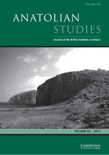
Anatolian Studies
Scope & Guideline
Illuminating the Richness of Anatolian History
Introduction
Aims and Scopes
- Archaeological Research:
The journal publishes articles that present new archaeological findings, site interpretations, and methodologies, emphasizing the importance of material culture in understanding past societies. - Cultural and Historical Analysis:
Anatolian Studies features research that provides insights into the social, political, and economic structures of ancient Anatolian civilizations, including their interactions with neighboring cultures. - Art and Architecture Studies:
The journal explores the artistic and architectural achievements of various periods in Anatolia, analyzing their significance and influence on broader Mediterranean and Near Eastern trends. - Interdisciplinary Approaches:
Research published in the journal often employs interdisciplinary methodologies, merging archaeology with history, art history, anthropology, and other fields to provide a comprehensive understanding of the past. - Regional Studies:
The journal covers various regions within Anatolia and adjacent areas, focusing on specific archaeological sites, historical developments, and cultural identities.
Trending and Emerging
- Gender and Identity in Antiquity:
Recent articles increasingly examine the roles of gender and identity in ancient societies, exploring how these factors influenced social structures and cultural practices. - Urban Development and Archaeology:
There is a growing focus on the urban development of ancient cities, particularly in relation to their chronological and spatial transformations, as seen in studies of Hattusa and other urban centers. - Scientific Techniques in Archaeology:
The application of scientific methodologies, such as chemical analysis and spatial autocorrelation, is on the rise, enhancing the understanding of archaeological contexts and material culture. - Religious Practices and Material Culture:
Emerging research highlights the relationship between religious practices and material culture, particularly in the context of Byzantine and Early Christian archaeology. - Cross-Cultural Interactions:
The exploration of interactions between various cultures, such as the Hellenistic and Roman influences in Anatolia, is increasingly prominent, reflecting a broader interest in globalization in the ancient world.
Declining or Waning
- Medieval Studies:
Research focusing specifically on the medieval period in Anatolia has decreased, possibly due to a growing interest in earlier periods or more contemporary themes. - Persian Influence:
While previously a topic of interest, studies examining the Persian presence and influence in Anatolia are appearing less frequently, suggesting a potential shift towards indigenous narratives. - Textual Analysis of Inscriptions:
The analysis of inscriptions, particularly from the Hellenistic and Roman periods, has seen a decline, possibly due to the journal's shift towards more archaeological and material studies. - Traditional Pottery Studies:
Research on traditional pottery styles and classifications appears less frequently, as the focus has shifted to more complex analyses involving chemical and technological approaches. - Local Myths and Legends:
Themes surrounding local myths and legends of ancient Anatolian cultures seem to be diminishing, reflecting a move towards more empirical and evidence-based research.
Similar Journals

JOURNAL OF MEDITERRANEAN STUDIES
Illuminating Interdisciplinary Insights from the MediterraneanJOURNAL OF MEDITERRANEAN STUDIES, based at the Mediterranean Institute, University of Malta, serves as a vital platform for scholarly discourse within the fields of anthropology, cultural studies, and the broader arts and humanities. Established with the aim of exploring the rich tapestry of Mediterranean cultures and societies, this journal offers an invaluable resource for researchers, professionals, and students alike. Although it operates under a traditional subscription model, the journal ensures comprehensive accessibility to its diverse range of articles, enhancing the visibility of Mediterranean studies. With an ISSN of 1016-3476 and E-ISSN 2523-9465, it garners attention across various academic ranks, notably a Q4 classification in multiple categories as per the 2023 evaluation, indicating its unique contributions to these disciplines despite its emerging status. As researchers delve into its volumes, they are invited to engage with a wealth of interdisciplinary insights that illuminate the Mediterranean’s complex social and cultural dynamics.
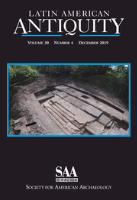
LATIN AMERICAN ANTIQUITY
Illuminating the Past: A Gateway to Latin America's Ancient CivilizationsLATIN AMERICAN ANTIQUITY is a prestigious journal published by Cambridge University Press, focusing on the archaeology and history of Latin America. With an impressive impact factor reflecting its critical role in the academic community, this journal exemplifies excellence in research, landing in Q1 across multiple categories, including Archaeology and History, as per the 2023 category quartiles. The journal's scope covers a broad range of topics related to pre-Columbian cultures, ancient civilizations, and historical developments, making it essential reading for researchers, professionals, and students keen on exploring the rich tapestry of Latin American heritage. Although it is not an open-access publication, LATIN AMERICAN ANTIQUITY remains a vital resource for those dedicated to advancing knowledge in this dynamic field. With its commitment to scholarly rigor and a strong ranking in Scopus, it serves as a cornerstone for academic dialogue and investigation.

TRANSACTIONS OF THE ANCIENT MONUMENTS SOCIETY
Engaging with the Timelessness of HeritageTRANSACTIONS OF THE ANCIENT MONUMENTS SOCIETY is a distinguished journal published by the Ancient Monuments Society in the United Kingdom, focusing on the rich interplay between architecture, conservation, and religious studies as they pertain to ancient monuments and heritage. With an ISSN of 0951-001X, this journal serves as an essential platform for researchers, professionals, and students interested in exploring methodologies, case studies, and theoretical perspectives that enhance our understanding of historical preservation and cultural significance. Although it has been classified in Q4 quartiles in prominent categories such as Architecture, Conservation, and Religious Studies, the journal plays a vital role in fostering scholarly dialogue in these areas. Access options and updates are available, making it easier for enthusiasts and experts alike to engage with ongoing discussions surrounding ancient monuments. Despite its discontinued coverage in Scopus, the journal remains an invaluable resource for those aiming to contribute to the conservation discourse and to understand the relevance of ancient sites in contemporary society.

Vestnik Drevnei Istorii-Journal of Ancient History
Illuminating the Past for a Brighter FutureVestnik Drevnei Istorii - Journal of Ancient History, published by the esteemed Russian Academy of Sciences and the State Academy of Humanities (GAUGN), plays a pivotal role in the interdisciplinary field of ancient studies. Fostering scholarly discourse since 2016, this journal is positioned at the crossroads of archaeology, classics, history, and linguistics, as evidenced by its impressive 2023 ranking in multiple categories, including Q1 in Classics and Q2 in History. Although not open access, it serves as a critical resource for researchers, professionals, and students interested in deepening their understanding of ancient societies and cultures. With a reputation for rigor and a commitment to advancing knowledge, the journal aims to disseminate innovative research that sheds light on the complexities of ancient civilizations and their contributions to contemporary society. Current issues and a wealth of archived articles are available for exploration, fostering a rich environment for scholarly engagement.
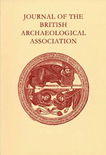
Journal of the British Archaeological Association
Advancing Insights into Archaeological PracticesJournal of the British Archaeological Association is a prestigious publication in the field of archaeology, dedicated to fostering scholarly dialogue and advancing research related to Britain's rich archaeological heritage. Published by Routledge Journals, Taylor & Francis Ltd, this journal serves as a vital platform for researchers, professionals, and students alike, offering insights into archaeological practices and findings from the United Kingdom and beyond. With an ISSN of 0068-1288 and an E-ISSN of 1747-6704, the journal has a notable history spanning from 1980 to the present, contributing significantly to the academic community. Currently categorized within Quartile 4 for archaeology and visual arts, it serves as a resource for emerging researchers while promoting innovative perspectives in archaeology. Although it operates under a traditional subscription access model, the quality and depth of content delve into significant archaeological discussions, making it an essential read for those seeking to broaden their understanding of archaeological methodologies and theories. The association's commitment to preserving and interpreting archaeological data ensures that the Journal of the British Archaeological Association remains an indispensable resource for anyone passionate about uncovering the past.

Journal of Ancient History and Archaeology
Connecting the Threads of Time Through ResearchJournal of Ancient History and Archaeology is a premier, open-access academic journal published by MEGA PUBLISHING HOUSE since 2014, dedicated to exploring the rich tapestry of ancient civilizations and archaeological discoveries. With ISSN 2360-266X, this journal has made significant strides in the field, achieving elevated rankings across multiple categories, including Q1 in Classics and Q2 in History as of 2023. Positioned in Romania, the journal serves an international audience of researchers, professionals, and students who seek to disseminate and access influential scholarship in ancient history and archaeology. As a prominent resource within the Scopus rankings, it reflects a robust commitment to advancing knowledge through quality research, making it a vital platform for the sharing and discussion of innovative ideas and methodologies. The journal covers a wide array of topics related to ancient societies, enhancing our understanding of their cultural, historical, and archaeological significance.
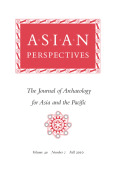
Asian Perspectives-The Journal of Archaeology for Asia and the Pacific
Advancing Knowledge: Illuminating Archaeological HeritageAsian Perspectives - The Journal of Archaeology for Asia and the Pacific is a prestigious journal published by University of Hawaii Press, focusing on the intricate field of archaeology in Asia and the Pacific. With a rich publication history dating back to 1993, the journal has established itself as a vital platform for disseminating research that illuminates the archaeological heritage and cultural dynamics of this diverse region. Recognized for its scholarly impact, it enjoys a commendable impact factor and ranks in the Q2 category for Anthropology and Archaeology, indicating its significant contribution to these fields. Although it operates on a traditional subscription-based model, the journal is accessible to institutional and individual subscribers worldwide. With an emphasis on interdisciplinary research, Asian Perspectives invites contributions that foster a deeper understanding of historical and contemporary issues through archaeology, making it an invaluable resource for researchers, professionals, and students alike committed to advancing scholarly dialogue in the region. Explore a wealth of innovative studies and insights that continue to shape the understanding of Asia and the Pacific's archaeological narrative.
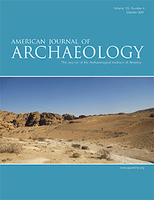
AMERICAN JOURNAL OF ARCHAEOLOGY
Connecting Cultures Through Archaeological DiscoveriesThe American Journal of Archaeology (ISSN: 0002-9114, E-ISSN: 1939-828X), published by the esteemed University of Chicago Press, stands as a leading scholarly journal in the field of archaeology, celebrated for its rigorous peer-reviewed research. With an impressive impact factor that places it in the Q1 quartile for both archaeology and archaeology within the arts and humanities, this journal ranks among the top 15% in its field, according to Scopus metrics. It serves a global audience of researchers, professionals, and students, facilitating the dissemination of innovative findings from excavations, historical analyses, and methodological advancements. While primarily available through subscription, the journal's archives and features provide invaluable resources for deepening one's understanding of the past and engaging with current archaeological discourse. Operating from its home in Chicago, USA, the American Journal of Archaeology actively contributes to the advancement of knowledge and scholarship in archaeology, making it an essential platform for those invested in the exploration of ancient civilizations and cultural heritage.

Ancient Civilizations from Scythia to Siberia
Illuminating the Mysteries of the Past, One Civilization at a TimeAncient Civilizations from Scythia to Siberia, published by BRILL, is a pivotal journal dedicated to the exploration and scholarly analysis of ancient cultures in Eurasia, with a focus spanning from the Scythian tribes to the Siberian territories. With an ISSN of 0929-077X and an E-ISSN of 1570-0577, this journal plays a significant role in the fields of Archeology, Classics, and History, holding esteemed rankings in Q3 and Q1 categories, thus affirming its status in the academic community. Covering a wide temporal range from 1995 to 2024, the journal aims to provide a comprehensive platform for researchers and students to disseminate their findings and foster collaborative discourse. With impact rankings in the 86th and 75th percentiles for Classics and History, respectively, it is recognized for its high-quality contributions that advance knowledge in these areas. Although currently not an open-access journal, it offers various options for accessing its rich content. By bridging gaps in historical understanding and engaging with the complexities of ancient societies, Ancient Civilizations from Scythia to Siberia remains an essential resource for those passionate about uncovering the narratives of our past.

Aula Orientalis
Illuminating History Through Rigorous ResearchAula Orientalis, an esteemed academic journal published by the Universitat de Barcelona's Institute of Ancient Near Eastern Studies, serves as a vital platform for scholarly discourse in the field of Near Eastern Archaeology, History, and Philology. With an ISSN of 0212-5730, this journal aims to disseminate high-quality research, fostering a deeper understanding of the ancient Near East through the publication of articles, reviews, and discussions by leading experts and emerging scholars alike. Although the journal has undergone changes in its indexing status, it continues to maintain a focus on rigorous academic standards and relevance in the global research community. Positioned at the crossroads of history and archaeology, Aula Orientalis encourages interdisciplinary collaboration and is ideal for researchers, professionals, and students seeking to expand their knowledge and engage with contemporary issues in ancient studies.